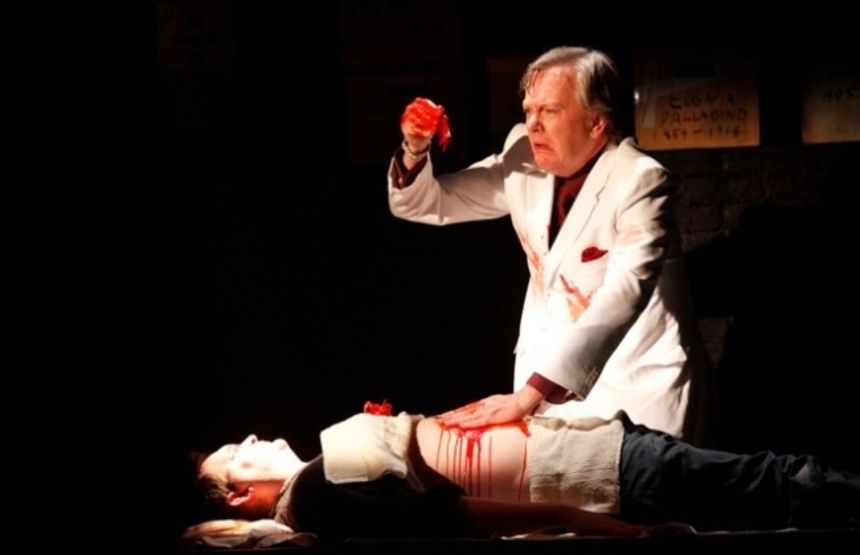Fantasia 2012 Review: PLAY DEAD

Raised in the carnival world on Coney Island, Robbins has apparently eaten over 4000 light bulbs in his career as a magician, lecturer and overall showman. And it, well, shows just how good he has gotten at it. After the lightbulb stunt, he gets into the meat of the show, stories of pedophiles, butchers, con-women and other urban and rural oddities that make for great old fashioned theatrics, but also some interesting audience participation. The lights are off, often. The only white object in the show is Robbins' pristinely pressed suit. It is soon covered in blood. The film is dedicated to Arthur Penn, perhaps best known for directing the classic (and ultra violent for the time) lovers on the run template Bonnie and Clyde, but also gothic chillers like Dead of Winter. Even more notable is that Penn (no relation to Mr. Jillette!) directed the criminally underrated Penn & Teller Get Killed, a weirdly meta film - why wouldn't it be, considering the two eponymous magicians who wrote and starred in it - that remained undistributed on DVD until it became available through the Warner's Archive (and it is probably the most recent film in the WA DVD imprint by about 30 years!) All of this is to say that Play Dead was developed and co-written with Robbins by none other than the silent half of Penn & Teller duo. Teller directs the film as well, but other than a teasing denial of a close-up of a particular optical illusion, feels pretty bare bones on the direction side. Back to my weird fascination with Penn & Teller Get Killed, in that the film features a massive and excellent debunking of so called Psychic Surgery, wherein a skilled illusionist (played by the man of a wonderful face, Leonardo Cimino) seemingly the guts of evil right out of his patient. Robbins does the trick magnificently midway through his performance here, but goes one big step better. It's a show-stopping bit of magic, with its own kind of prestige.
Teller (and apparently Robbins) have a keen understanding of why people watch magic (and the Macabre) and showmanship is always the key thing. The audience doesn't care how the trick is done, only that they are fooled and entertained - and in this case scared or grossed out to boot. There is a sense of history here too, even if the characters with names such as Eusapia Palladino or Albert Fish are likely made up. I'm reminded of the mixture of magic and historical context and definitely playful joy of magician and scholar Ricky Jay. As he tells a tale of a long forgotten magician who plies his trade: "For this indiscretion Seneca relegates the emperor to a Sisyphean gamester's hell: condemned eternally to pick up the bones and throw them into a dice cup that has no bottom."

Do you feel this content is inappropriate or infringes upon your rights? Click here to report it, or see our DMCA policy.






